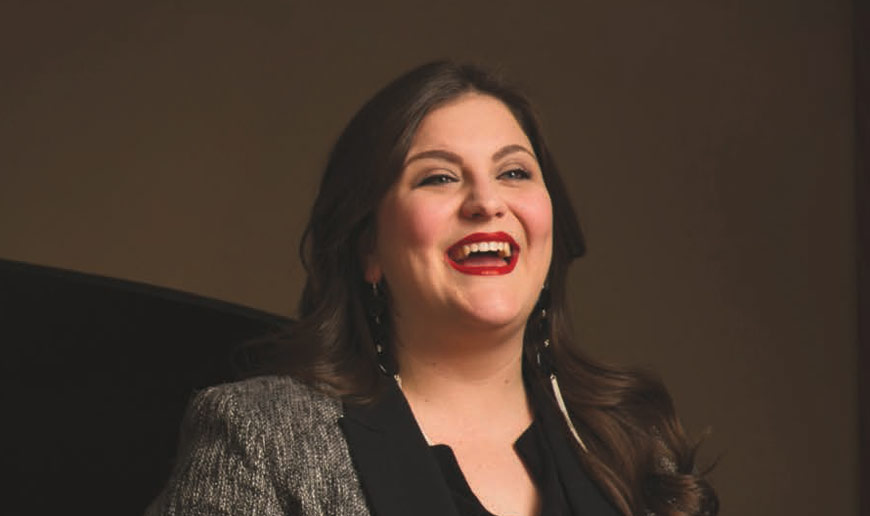“I’m making a living as a musician. I’m a voice teacher, a performer and an opera singer. And it’s all because of them that I’m able to do it.”

Natalie Megules had a double major in Voice Performance and Musical Theater at Westminster Choir College when she suddenly lost her voice. With a full schedule (sometimes performing in several concerts in one weekend), coming down with laryngitis is hardly unusual.
But this time it was different. While laryngitis typically disappears in about a week, Ms. Megules just couldn’t seem to shake it. “My voice would get very tired, very quickly and I was having a really hard time singing. But when I couldn’t make it though an hour-long rehearsal, I knew it was something far more serious than laryngitis.”
That’s when her voice teacher referred her to Dr. Michael Goldrich, Clinical Associate Professor of Surgery at Robert Wood Johnson Medical School, Chief of Otolaryngology and Director of the Voice Center of New Jersey at Robert Wood Johnson University Hospital (RWJ). Dr. Goldrich discovered that Ms. Megules had an active hemorrhage in one of her vocal chords—the same injury from which Oscar-winning singer-songwriter Adele suffered.
A vocal hemorrhage happens when the voice is used forcefully and the tiny blood vessels that feed the cords rupture and leak. Surgery can fix this problem but is often a last resort when it comes to vocal cords.
In fact, Dr. Goldrich explained that he and his team worked hard to avoid surgery. “We work very closely with our speech pathologists and singing coaches to find the most conservative means to rehabilitate a variety of voice problems,” he said.
But unfortunately, for Ms. Megules surgery was unavoidable.
Microlaryngeal Microflap Surgery is a minimally invasive technique that allows surgeons to remove growths in the larynx, like cysts or polyps that do not respond to more conservative treatments.
During this procedure, a laryngoscope (a small metal tube) is placed in the mouth to provide exposure of the vocal cords so doctors can visualize them under magnification. Depending on the lesion, the operation can take between 30 minutes and two hours.
“It’s a very delicate surgery,” Dr. Goldrich said. “The vocal cord is only a centimeter in length so the abnormalities may only be a few millimeters in size. Our goal is to repair the problem, while minimizing damage to normal structure of the vocal cord.”
The team at Robert Wood Johnson consists of some of the most skilled voice specialists in the industry. “We use scanning lasers and other advanced technology, but some of the instruments we use to perform surgery were custom-made just for us,” Dr. Goldrich said.
Ms. Megules credits the doctors at RWJ for her quick recovery and success in the music industry. “I’m making a living as a musician. I’m a voice teacher, a performer and an opera singer, “ she said. “And it’s all because of them that I’m able to do it.”
For Dr. Goldrich, helping talented people like Natalie continue to pursue their dreams is the best part of the job. He attributes his success to the right equipment, a uniquely trained staff and an incredible team effort.